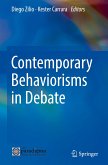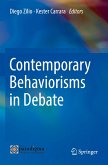This book shows how the three-term contingency paradigm created by B.F. Skinner can be applied to describe and explain cultural practices phenomena produced by complex relations between behavior and environment. It updates the academic debate on the best paradigm to analyze complex social interactions (contingency or metacontingency), arguing that Skinner's three-term contingency - the conceptual tool created to analyze human behavior by decomposing it in three parts: discriminative stimulus, operant response and reinforcement/punishment - is the best unit of analysis since what is selected in social interactions are not the actions of the group but of individuals gathered in a group situation to form an articulated and interlocked behavioral practice.
The author argues in favor of a relational approach to study behavior and identifies its theoretical foundations in the philosophy of Ernst Mach, especially in Mach's concept of functional relations and its influence on Skinner.Departing from this theoretical framework, the author argues that behavior can only be studied through the analysis of how it emerges from relations, and cannot be explained by hypothetical constructs such as cognitive maps, personality formation mechanisms, drives, traits and preconceived motivational forces.
Radical Behaviorism and Cultural Analysis will be of interest to psychology researchers and students interested in the theoretical foundations of behavior analysis, as well as to social scientists and policy makers from other areas interested in how behavior analysis can be used to study complex social interactions and how it can be applied to build a more fair and sustainable society through cultural planning and the development of prosocial behavior.
The author argues in favor of a relational approach to study behavior and identifies its theoretical foundations in the philosophy of Ernst Mach, especially in Mach's concept of functional relations and its influence on Skinner.Departing from this theoretical framework, the author argues that behavior can only be studied through the analysis of how it emerges from relations, and cannot be explained by hypothetical constructs such as cognitive maps, personality formation mechanisms, drives, traits and preconceived motivational forces.
Radical Behaviorism and Cultural Analysis will be of interest to psychology researchers and students interested in the theoretical foundations of behavior analysis, as well as to social scientists and policy makers from other areas interested in how behavior analysis can be used to study complex social interactions and how it can be applied to build a more fair and sustainable society through cultural planning and the development of prosocial behavior.








